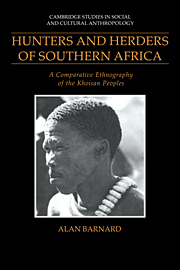Book contents
- Frontmatter
- Contents
- List of figures and maps
- List of tables
- Preface
- A note on orthography
- Part I The Khoisan peoples
- Part II A survey of Khoisan ethnography
- 3 The !Kung
- 4 The !Xõ and Eastern ≠ Hoã
- 5 The Southern Bushmen
- 6 The G/wi and G//ana of the central Kalahari
- 7 The Eastern and Northern Khoe Bushmen
- 8 The Nharo
- 9 The Cape Khoekhoe and Korana
- 10 The Nama and others
- 11 The Damara and Hai//om
- Part III Comparisons and transformations
- References
- Index
- Cambridge Studies in Social and Cultural Anthropology
11 - The Damara and Hai//om
Published online by Cambridge University Press: 05 June 2012
- Frontmatter
- Contents
- List of figures and maps
- List of tables
- Preface
- A note on orthography
- Part I The Khoisan peoples
- Part II A survey of Khoisan ethnography
- 3 The !Kung
- 4 The !Xõ and Eastern ≠ Hoã
- 5 The Southern Bushmen
- 6 The G/wi and G//ana of the central Kalahari
- 7 The Eastern and Northern Khoe Bushmen
- 8 The Nharo
- 9 The Cape Khoekhoe and Korana
- 10 The Nama and others
- 11 The Damara and Hai//om
- Part III Comparisons and transformations
- References
- Index
- Cambridge Studies in Social and Cultural Anthropology
Summary
Hunters or herders?
In this chapter, we shall examine the two major groups which transcend the hunter–herder boundary. The Damara, Hai//om, and various small groups of non-Kalahari foragers, all live in northern Namibia (see Figure 11.1). All these groups speak the language known as Nama, Nama-Damara, Damara-Nama, or Damara. They have engaged until recently in foraging activities, though in some groups livestock have long been kept as well. None of these groups is traditionally classified as ‘Khoekhoe’ (either by the Khoekhoe themselves or by outsiders), but they do have cultural attributes which align them as much with the Khoekhoe as with the Bushmen.
The Damara
The last powerful Damara chief was Cornelius Goraseb. He died in 1910 with this prophecy: ‘I know that when I am no more, my peoples will be scattered like chaff in the wind’ (First 1963: 37). The Germans granted Cornelius Goraseb the title König (‘king’), and his grandson, the last to claim this title, died in 1976, in serious dispute with some of his fellow Damara leaders, and still without a kingdom. The Damara had already been scattered, and remaining Damara groups are found over an extensive area of northeastern, central, and southern Namibia. In the past, they were often attached as clients or servants to Nama or Herero clans. Not much is known about their way of life while under Nama and Herero domination in the nineteenth century and before.
- Type
- Chapter
- Information
- Hunters and Herders of Southern AfricaA Comparative Ethnography of the Khoisan Peoples, pp. 199 - 220Publisher: Cambridge University PressPrint publication year: 1992

